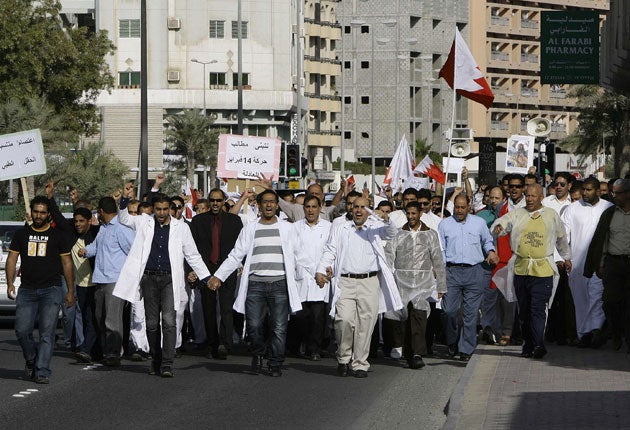Doctors turn on each other as sectarianism tears Bahrain apart

Your support helps us to tell the story
From reproductive rights to climate change to Big Tech, The Independent is on the ground when the story is developing. Whether it's investigating the financials of Elon Musk's pro-Trump PAC or producing our latest documentary, 'The A Word', which shines a light on the American women fighting for reproductive rights, we know how important it is to parse out the facts from the messaging.
At such a critical moment in US history, we need reporters on the ground. Your donation allows us to keep sending journalists to speak to both sides of the story.
The Independent is trusted by Americans across the entire political spectrum. And unlike many other quality news outlets, we choose not to lock Americans out of our reporting and analysis with paywalls. We believe quality journalism should be available to everyone, paid for by those who can afford it.
Your support makes all the difference.In another sign of the growing sectarianism in the crisis in Bahrain, friends of imprisoned Shia Muslim doctors in the country are circulating lists of Sunni Muslim medical staff whom they claim have been sent to spy on them and to give false evidence against them in courts.
The new list includes doctors, interns, senior accident and emergency officials, ophthalmologists, paediatricians and staff nurses.
The Bahraini government itself sectarianised Shia demands for representative democracy in the Gulf monarchy earlier this year when it stated that doctors at the Salmaniya Medical Complex deliberately discriminated against Sunni patients at the hospital during the February pro-democracy protests. The Shia doctors, who have strenuously denied these claims, are part of the majority in Bahrain; the minority Sunnis comprise the monarchy and occupy senior positions in almost all major state security institutions.
But the latest file, which was shown to me this week by a Bahraini doctor, gives an even more poisonous edge to what is fast becoming a Shia-Sunni struggle for power. Already Shia doctors have been beaten in police custody, faced trumped-up charges of arms crimes and of allowing patients to die needlessly in hospital. Most of us who were witness to the fact that these charges are lies – for we were in the Salmaniya hospital at the time – are now, unsurprisingly, banned from the kingdom.
Among the cases now being documented by Shia Muslims – and there is no way of knowing whether they are true or are as mendacious as the government's statements – include claims that one ophthalmologist betrayed a Shia colleague; a general surgeon who told Bahraini television that "only" seven patients had been in the Salmaniya hospital during the violence; and two dermatologists who announced that "heavy weapons" were hidden inside the health centre.
There is no way of confirming these extraordinary allegations made by Shia Muslims but it is the first example of an openly sectarian medical dispute since the Rwandan genocide.
Shia Muslims in Bahrain have often misused the word "genocide" to describe their own democratic struggle – as if the government is engaging in mass slaughter, which is not true – but the authorities, in whose custody at least four prisoners have died since February, all apparently after being tortured, make no pretence at being a democracy.
The Bahraini authorities are aware of the already circulating list of Sunni doctors, which will only further factionalise the medical community in the country. When a named staff nurse is accused of "providing information" about several staff nurse colleagues "who are still under detention", it is difficult to see how these personnel can ever work together again.
Two Sunni interns – again, named – are alleged to have led armed men into the sixth floor of the Salmaniya medical centre to arrest patients who were subsequently taken away and beaten. The interns were needed to read the patients' medical files since the security forces – many in the Bahraini military are in fact Pakistanis – could not read English.
Join our commenting forum
Join thought-provoking conversations, follow other Independent readers and see their replies
Comments